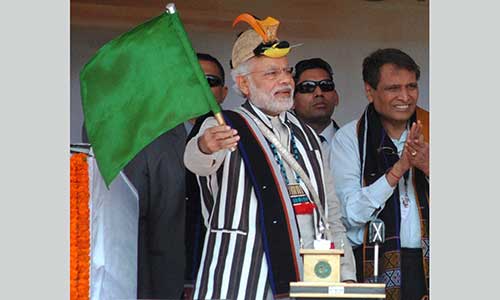China has called in India’s ambassador to protest Prime Minister Narendra Modi’s visit to a disputed Himalayan border region.
On Friday, Modi visited the northeastern Indian state of Arunachal Pradesh, an immense territory of nearly 84,000 square kilometers (more than 32,000 square miles) that China says is part of its Tibet region. The border has not been properly demarcated since the two countries fought a month-long war in 1962 that left about 2,000 soldiers dead.
Modi marked the 28th anniversary of Arunachal Pradesh being declared a state and opened a train line.
The Chinese Foreign Ministry said late Saturday that Vice Foreign Minister Liu Zhenmin summoned Indian Ambassador Ashok Kantha to express ‘strong dissatisfaction and firm opposition’ to the visit, saying that it undermined China’s territorial sovereignty.
Times of India adds: The TOI quoted Chinese foreign ministry spokeswoman Hua Chunying as saying, ‘The Chinese government has never recognized the so-called Arunachal Pradesh.’
During the meeting with ambassador Ashok Kantha, vice-foreign minister Liu Zhenmin pointed out that this act by the Indian side ‘undermined China’s territorial sovereignty, right and interests’, the Xinhua report said.
He said such an act by the Indian side artificially amplified differences between the two countries on the border issue and thus went against the principles and consensus that the two sides reached on properly addressing the issue.
Liu reiterated China’s ‘consistent and clear-cut stance on the China-India border issue’, saying the Chinese government ‘has never recognized the so-called Arunachal Pradesh unilaterally set up by the Indian side’.
It was ‘a universally recognized, unevadable fact that significant disputes do exist on the eastern section of the China-India border’, Liu said.
He emphasised that China placed importance on developing relations with India. He said the two countries, as neighbours and the top two developing countries in the world, shared broad prospects on cooperation at various levels.
Liu called on the Indian side not to take any action that might complicate the border issue and stick to the general orientation of resolving the issue through bilateral negotiations to maintain the overall growth of bilateral relations.
Modi, who arrived in Arunachal Pradesh’s capital on Friday, flagged off the Naharlagun-New Delhi Express by pressing a button at a function held in Indira Gandhi Park in Itanagar.
The Prime Minister hoped the boost in communications through the railway would propel growth and development in Arunachal Pradesh and other parts of the northeast.
Modi, who was accompanied by Union railway minister Suresh Prabhu, minister of state for railways Manoj Sinha and minister of state for home Kiren Rijiju, also inaugurated an intercity train between Naharlagun and Guwahati and laid the foundation stone of a 132KV power transmission project and another project to provide pure drinking water to the residents of the capital town.
President Pranab Mukherjee’s visit to the state last year had also drawn sharp reactions from China, which has often laid claim to the state.
On Friday, Modi visited the northeastern Indian state of Arunachal Pradesh, an immense territory of nearly 84,000 square kilometers (more than 32,000 square miles) that China says is part of its Tibet region. The border has not been properly demarcated since the two countries fought a month-long war in 1962 that left about 2,000 soldiers dead.
Modi marked the 28th anniversary of Arunachal Pradesh being declared a state and opened a train line.
The Chinese Foreign Ministry said late Saturday that Vice Foreign Minister Liu Zhenmin summoned Indian Ambassador Ashok Kantha to express ‘strong dissatisfaction and firm opposition’ to the visit, saying that it undermined China’s territorial sovereignty.
Times of India adds: The TOI quoted Chinese foreign ministry spokeswoman Hua Chunying as saying, ‘The Chinese government has never recognized the so-called Arunachal Pradesh.’
During the meeting with ambassador Ashok Kantha, vice-foreign minister Liu Zhenmin pointed out that this act by the Indian side ‘undermined China’s territorial sovereignty, right and interests’, the Xinhua report said.
He said such an act by the Indian side artificially amplified differences between the two countries on the border issue and thus went against the principles and consensus that the two sides reached on properly addressing the issue.
Liu reiterated China’s ‘consistent and clear-cut stance on the China-India border issue’, saying the Chinese government ‘has never recognized the so-called Arunachal Pradesh unilaterally set up by the Indian side’.
It was ‘a universally recognized, unevadable fact that significant disputes do exist on the eastern section of the China-India border’, Liu said.
He emphasised that China placed importance on developing relations with India. He said the two countries, as neighbours and the top two developing countries in the world, shared broad prospects on cooperation at various levels.
Liu called on the Indian side not to take any action that might complicate the border issue and stick to the general orientation of resolving the issue through bilateral negotiations to maintain the overall growth of bilateral relations.
Modi, who arrived in Arunachal Pradesh’s capital on Friday, flagged off the Naharlagun-New Delhi Express by pressing a button at a function held in Indira Gandhi Park in Itanagar.
The Prime Minister hoped the boost in communications through the railway would propel growth and development in Arunachal Pradesh and other parts of the northeast.
Modi, who was accompanied by Union railway minister Suresh Prabhu, minister of state for railways Manoj Sinha and minister of state for home Kiren Rijiju, also inaugurated an intercity train between Naharlagun and Guwahati and laid the foundation stone of a 132KV power transmission project and another project to provide pure drinking water to the residents of the capital town.
President Pranab Mukherjee’s visit to the state last year had also drawn sharp reactions from China, which has often laid claim to the state.
Source: New Age









